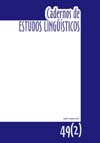Resumo
Além da tese de que a gramática das línguas naturais inclui um nível transformacional, o que distingue o programa Chomskyano de investigação em Teoria da Gramática das outras abordagens é a tese de que o conhecimento gramatical internalizado por todo o ser humano é parcialmente inato (i.e.parcialmente dado a priori por um sistema de viéses cognitivos tarefa-específicos da Gramática Universal), e não um subproduto de mecanismos auto-organizáveis de ‘inteligência geral’. Esta tese científica pode, em princípio, estar certa ou errada, e só pode ser questionada levando-se em conta a sua cobertura empírica e a lógica dos seus argumentos. No cerne desta questão está o Argumento de Pobreza de Estímulo (APS), cuja lógica tem sido alvo de inúmeros mal-entendidos por parte dos anti-inatistas, a exemplo de Geurts (2000), que deixa de reconhecer as distinções entre ‘conhecimento’ e ‘crença’, e entre cognição ‘consciente’ e ‘não-consciente’, as quais são cruciais para a compreensão da lógica do APS. O objetivo deste artigo é desfazer esse mal-entendido.
Referências
AKHTAR, N., M. CALLANAN, G. PULLUM & B. SCHOLZ. 2004. Learning Antecedents for Anaphoric ‘One’. Cognition, 93: 141-145.
BAKER, M. (2005). The Innate Endowment for Language: underspecified or overspecified? In: P. Carruthers, S. Laurence & S. Stich (eds.) The Innate Mind: structure and contents. Oxford: Oxford University Press.
CHOMSKY, N. (1967). Recent Contributions to the Theory of Innate Ideas. Synthese,17.
CHOMSKY, N. (1986). Knowledge of Language: its origin, nature and use. New York: Praeger.
CONROY, A., E. TAKAHASHI, J. LIDZ & C. PHILLIPS. (2006). Equal Treatment for all Antecedents: How Children Succeed with Principle B. http://www.ling.umd.edu/~colin/research/papers/ ctlp2006.pdf
COWIE, F. (1999). What’s Within? Nativism Reconsidered. New York: Oxford University Press.
CRAIN, S. & M. NAKAYAMA. (1987). Structure Dependence in Grammar Formation. Language, 63: 522-543.
CRAIN, S. & P. PIETROSKI. (2001). Nature, Nurture, and Universal Grammar. Linguistics and Philosophy, 24: 139-186.
CRAIN, S. & P. PIETROSKI. (2002). Why Language Acquisition is a Snap. The Linguistic Review, 19: 163-183.
CRAIN, S. & R. THORNTON. (1998). Investigations in Universal Grammar: A Guide to Experiments on the Acquisition of Syntax and Semantics. Bradford Book.
CRAIN, S., A. GUALMINI & P. PIETROSKI. (2005). Brass Tacks in Linguistic Theory: innate grammatical principles. In: P. Carruthers, S. Laurence & S. Stich (eds.) The Innate Mind: structure and contents. Oxford: Oxford University Press. pp. 175-197
EICHLER, M. & L. FAGUNDES. (2005). Atualizando o Debate entre Piaget e Chomsky em uma Perspectiva Neurobiológica. Psicologia: Reflexão e Crítica, 18: 255-266.
ELBOURNE, P. (2005). On the Acquisition of Principle B. Linguistic Inquiry, 36: 333-365.
FODOR, J. & C. CROWTHER. (2002). Understanding Stimulus Poverty Arguments. The Linguistic Review, 19: 105-145.
GEURTS, B. (2000). Review of S. Crain & R. Thornton, Investigations in Universal Grammar. Linguistics and Philosophy, 23: 523-532.
GOLDBERG, A. (2003). But Do We Need Universal Grammar? Comment on Lidz et al. (2003). Cognition, 94: 77-84.
GROSS, A. & S. NAVEGA. (2002). Forty-Four Reasons Why Chomskyans are Mistaken. http:// language.home.sprynet.com/lingdex/chomrong.htm
GUALMINI, A. & S. CRAIN. (2005). The Structure of Children’s Linguistic Knowledge. Linguistic Inquiry, 36: 463-474.
LASNIK, H. & J. URIAGEREKA. (2002). On the Poverty of the Challenge. The Linguistic Review, 19: 147-150.
LEGATE J. & C. YANG. (2002). Empirical re-assessment of Stimulus Poverty Arguments. The Linguistic Review, 19: 151-162.
LEWIS, J. & J. ELMAN. (2001). Learnability and the Statistical Structure of Language: poverty of stimulus arguments revisited. Proceedings of the 26th Annual Boston University Conference on Language Development. Somerville, MA: Cascadilla Press.
LIDZ, J. & L. GLEITMAN. (2004). Yes, We Still Need Universal Grammar. Cognition, 94: 85-93.
LIDZ, J., S. WAXMAN & J. FREEDMAN. (2003). What Infants Know about Syntax but Couldn’t Have Learned: evidence for syntactic structure at 18-months. Cognition, 89, B65–B73.
LIDZ, J. & S. WAXMAN. (2004). Reaffirming the Poverty of the Stimulus Argument: a reply to the replies. Cognition, 93: 157-165.
MARCUS, G. (1999). Language Acquisition in the Absence of Explicit Negative Evidence: can simple recurrent networks obviate the need for domain-specific learning devices? Cognition, 73: 293296.
MÜLLER, R-A. (1996). Innateness, Autonomy, Universality? neurobiological approaches to language. Behavioral and Brain Sciences, 19: 611-675.
NEVINS, A. (2004). What UG Can and Can’t do to Help the Reduplication Learner. In: A. Csirmaz, A. Gualmini & A. Nevins (eds.) Plato’s Problem: Problems in Language Acquisition. MITWPL, 48: 113-126.
PARISSE, C. (2005). New perspectives on language development and the innateness of grammatical knowledge. Language Sciences, 27: 383-401.
PEARL, L. & J. LIDZ. (2006). When Domain General Learning Fails and When it Succeeds: identifying the contribution of domain specificity. (submitted to Cognition).
PEARL, L. & A. WEINBERG. (2007). Input Filtering in Syntactic Acquisition: answers from language change modeling. Language Learning and Development, 3: 45-74.
PIATELLI-PALMARINI, M. (ed.). (1980). Language and learning: The debate between Jean Piaget and Noam Chomsky. Cambridge, MA: Harvard University Press.
PULLUM, G. & B. SCHOLZ. (2002). Empirical Assessment of Stimulus Poverty Arguments. The Linguistic Review, 19: 9-50.
REGIER, T. & S. GAHL. (2004). Learning the Unlearnable: the role of missing evidence. Cognition, : 147-155.
ROSS, J. (1967). Constraints on Variables in Syntax. Ph.D. dissertation. MIT.
TOMASELLO, M. (2004). What kind of evidence could refute the UG hypothesis? Studies in Language 28: 642–645.
YANG, C. (2002). Knowledge and Learning in Natural Language. Oxford: Oxford University Press.
YANG, C. 2004. Universal Grammar, Statistics or Both? Trends in Cognitive Science, 8: 451-456.
YANG, C. 2006. The Infinite Gift: how children learn and unlearn the languages of the world. New York: Scribner.
O periódico Cadernos de Estudos Linguísticos utiliza a licença do Creative Commons (CC), preservando assim, a integridade dos artigos em ambiente de acesso aberto.

